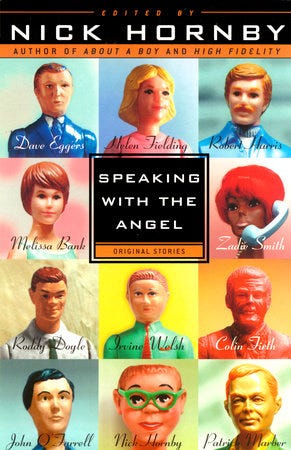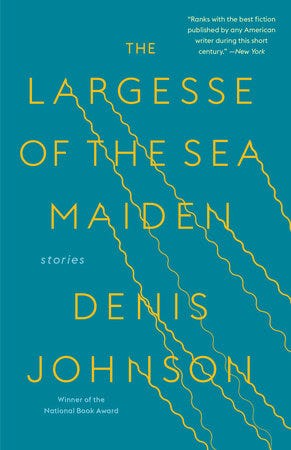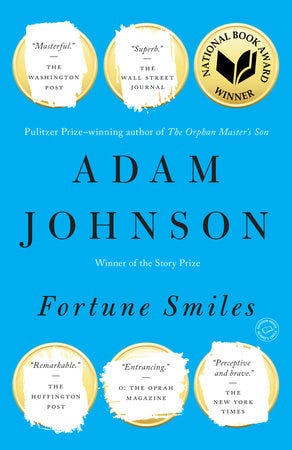Reading Lists
7 Books About Conflicted Spirituality
Emily W. Pease, author of “Let Me Out Here,” recommends literature about the sacred and the strange

Some years after I began writing fiction, I hit a wall. What was I up to, writing these stories? One night, while crossing the campus where I worked, ironically, as a teacher of writing, I began to doubt that a writer like me could fit in anywhere. Then a voice of reason came to me, or maybe it was a voice of grace. All you can do is be yourself. No one in the world has your exact experiences to draw on, so just write who you are.
But who was I? A southern white woman with an intact family and deep Presbyterian roots. A kid whose sixth-grade teacher recited the Bible each day and made the girls rub her neck with cold cream. A Girl Scout whose mother sent her to primitive camp at fourteen. A girl who shed tears of devotion during communion while fighting the urge to rebel. Who saw a church retreat as an opportunity to visit a biker bar. Who spent her first real paycheck on a pet raccoon.
We all have our stories, and what we write, and how we write, springs from who we are: our memories, experiences, preoccupations, and obsessions. Now that I have a collection of stories, Let Me Out Here, I can see at least one strong theme emerge, and it’s based on who I am and what is mine to tell. A few of my stories are ridiculous, and a few touch on matters of the spirit, or belief. Things don’t often turn out well. So this theme might be called meaning and menace. Or let’s call it the sacred and the strange.
A Manual for Cleaning Women by Lucia Berlin
There’s no “church” in Lucia Berlin’s stories, although the worlds she creates, which for the most part are worlds she herself inhabited, are suffused with Catholic tradition. In “El Tim,” a lay teacher in a school run by nuns is assigned a pupil fresh out of detention. He needs to be “encouraged and challenged,” reports the detention center, so it’s up to Mrs. Lawrence, the lay teacher, to encourage and challenge him. Tim is pure menace, and in his presence the other pupils, and even the school principal, cower. When the boy refuses to button his shirt, his gold crucifix gleaming on his bare chest, Sister Lourdes, the principal, fumbles with the buttons and does it for him. After this, she buttons him everyday, she’s so intimidated by him. Here we have a standard set-up: the terrible boy, the trembling students and principal, and the lay teacher who will be the hero. Surely, redemption is on the way. But not in the hands of Lucia Berlin. Mrs. Lawrence hits El Tim across the mouth, stunning him. When she leads him back to class, she avoids “the beat of his walk.”
It’s the frankness in Lucia Berlin’s stories that gets to me. Everybody’s flawed, everybody’s just trying to live an OK life. But life can be brutal. Take, for instance, this passage from “Panteon de Dolores,” a story I especially admire:
Ofrendas are fun to make. Offerings to the dead. You make them as pretty as you can…On the ofrendas you place everything the dead person might be wishing for. Tobacco, pictures of the family, mangos, lottery tickets, tequila, postcards from Rome. Swords and candles and coffee. Skulls with friends’ names on them. Candy skeletons to eat. On our mother’s ofrenda my sister’s children had put dozens of Ku Klux Klan figures. She hated them for being the children of a Mexican. Her ofrenda had Hershey bars, Jack Daniel’s, mystery books, and many, many dollar bills. Sleeping pills and guns and knives, since she was always killing herself.
Speaking with the Angel edited by Nick Hornby
This wonderful collection of stories was created by Nick Hornby as a fundraiser for TreeHouse, a school for autistic children that his son attended at the time. The book was published in 2000, and it is, thank goodness, still in print. I say thank goodness because it contains one of the funniest and wisest short stories I know: “Nipplejesus.” In this story, Hornby gives us Dave, a hulking former nightclub bouncer (“six foot two and fifteen stone”) who lands a job as a guard in an art gallery. Because he’s such a big man, he’s assigned the room containing “Nipplejesus,” a painting composed of hundreds of cut-outs of nipples. In other words, it’s his duty to watch over Jesus, in nipple form. This is another story I could never omit from my syllabus.
Stories of Your Life and Others by Ted Chiang
Ted Chiang possesses the wild imagination of a pure science fiction writer, so it’s thrilling to see him use key theological problems as the basis of a short story, “Hell Is the Absence of God.” Is suffering redemptive, or is suffering merely suffering? Does God cause pain, or is pain merely pain? And what about hell? In Chiang’s hands, a character named Neil Fisk learns to “love God.” But not in the way one would expect. Born with a congenital defect, Neil always wonders whether he’s been punished by God. Then the angel Nathaneal makes a fiery appearance downtown, actuating miracle cures. Yet eight people also die, thanks to the angel, including Neil’s wife. Says the narrator, “Scores of people became devout worshipers in the wake of the visitation, either out of gratitude or terror. Alas, Neil Fisk wasn’t one of them.”
Neil does go on a kind of quest, though, looking to make sense of it all. Along the way, he meets a woman named Janice who has flipper-like legs, a deformity caused by the visitation of the angel Bardiel. Unlike Neil, Janice is grateful for her affliction, her “special assignment” that gives her the power to speak to audiences and inspire them. But when yet another angel comes along, and she is given two strong legs, she loses her ability to inspire. Her gain is her loss. “Clearly,” says the narrator, “God had made her task more difficult than it was before….” You have to love this audacious irony. Is hell the absence of God?
The Largesse of the Sea Maiden by Denis Johnson
It’s rare to feel left in awe. But these final stories by Denis Johnson do it to me, leaving me feeling breathless, like you just can’t believe someone could write with such fierce empathy. “Nobody wrote with more brutality and mercy, more hilarity and grace,” wrote Elizabeth McCracken in her blurb for the book. Brutality and mercy: what a perfect pair. I’m left wanting to quote passages from every story, but instead I’ll just offer two.
From the title story: “This morning I was assailed by such sadness at the velocity of life — the distance I’ve traveled from my own youth, the persistence of old regrets, the new regrets, the ability of failure to freshen itself in novel forms — that I almost crashed the car.”
And then this, from “The Starlight On Idaho”:
“What do they feed you when you’re the Pope? Try the stuff around here sometime. For lunch they give you a marshmaller and a coffee bean. It’s a salvage yard for people who totaled their souls called the Starlight Recovery Center in Ukiah, California on Idaho Avenue. Ah hell what’s wrong with me? I won’t be sending no letter to the Pope.”
Fortune Smiles by Adam Johnson
In this fine collection of seven stories, two stand out for me. The first, “Nirvana,” comes straight out of Silicon Valley, where a talented A.I. developer brings the president, recently assassinated, back to life on a screen. The president can talk, respond, and reassure, if only in two dimensions. Disembodied, he’s still able to inspire. And while he inspires thousands of people, the one he inspires most is his creator, who speaks to him out of his loneliness. His wife, a victim of Guillaine-Barre Syndrome, is confined to bed, paralyzed from the shoulders down. In her despair, she has asked her husband to promise that when she can take it no more, he’ll help her commit suicide. To ease her pain, she listens constantly to Nirvana — to Kurt Cobain, who took his own life. She can relate.
God comes in this story in the weirdest ways. I doubt Adam Johnson would agree. God? But there’s a drone in this story, and it enables Charlotte, the paralyzed wife, to visit her garden remotely. Wearing a headset, she can smell her roses. And then there’s hope for a baby: she reasons that if she can’t live, maybe she can give life. And finally there’s Kurt Cobain. “I only appreciate things when they’re gone,” he sings. He appears on a screen.
The other story in this collection I can’t forget, “Dark Meadow,” doesn’t offer anything really spiritual or redemptive, although the story does open a reader to feel deep empathy. Told in the point of view of a shaky and self-aware child molester, the story reveals the sordid business of child pornography. Imagine the risk Johnson took, conceiving such a story. Yet he manages to bring to life the pain of a man who was molested as a boy and whose memories won’t give him rest. There are sizzling moments in this story, and there are sweet, tenuous moments as well. This isn’t a story that lingers in your mind. It stays.
Pulphead by John Jeremiah Sullivan
Fourteen years ago, on assignment for GQ, John Jeremiah Sullivan rented an enormous RV and headed out to Creation, a Christian rock festival in “ruralmost Pennsylvania…a veritable Godstock.” The result is a stunning piece of journalism titled “Upon This Rock,” which opens his collection of essays. Sullivan can be very funny (“Christian rock is a musical genre, the only one I can think of, that has excellence-proofed itself”), but his best gift is his openness. He observes everything openly, with a clear eye and a deft ear. He’s so open, in fact, that he ends up hanging out with five guys from West Virginia who take him in as one of them. One night, they even pile inside Sullivan’s RV for hours, talking, playing the guitar, and listening for the mountain lion that they’re sure is lurking outside.
Midway into the essay, Sullivan digresses and tells his own story: how he, a kid who grew up in the Episcopal church, got drawn into an evangelical crowd when he was in high school, how he was so drawn in that he became a leader, good at witnessing. And then how (he doesn’t go deep into this), he backed off. This part of Sullivan’s essay has the effect of validating him and making him trustworthy. Whatever he observes at the festival, he observes from a place of understanding, which leaves him open to a final moment of self-discovery. At the end of the essay, he confesses that he came to love the little gang who became his friends. “It may be the truest thing I will have written here: they were crazy, and they loved God — and I thought about the unimpeachable dignity of that, which I was never capable of.”
God: Stories edited by C. Michael Curtis
Here we have twenty-five stories “about” God, published in 1998. Conceived by C. Michael Curtis, editor of fiction at The Atlantic, this collection gives us stories that “encounter spirituality in its human dimensions,” as Curtis writes in his introduction. All manner of encounters, as it happens. Included are James Baldwin’s painful and complicated “Exodus,” Louise Erdrich’s sexy “Satan: Hijacker of the Planet,” and Andre Dubus’s classic “A Father’s Story.” To me, this collection is notable for its inclusion of “Parker’s Back,” which might just be the most brutal and vivid “Christian” story Flannery O’Connor wrote. As a teacher, I could never leave this story off my syllabus.
TV Series: Crashing by Pete Holmes
My final recommendation is not a plug; it’s not like I’m saying, “You’ve gotta watch this show!” Rather, if I have to be honest about the work that influences me — that inspires me and makes me want to create something even half as good — I must mention Pete Holmes, the stand-up comedian who writes and stars in this comedy series about: himself. Holmes came from what people used to call “a good Christian home,” and he spent his early youth in an evangelical church. He married his sweetheart. He had a talent for comedy. He started doing stand-up, and then his wife left him. He crashed.
Bereft, doubting himself and everything, he leaned on his friends. And this is the basic premise of Crashing, a comedy series he created four years ago and that’s now finishing its third season. A comedian abruptly goes from married to single, so he crashes on different couches, which happen to be the couches of fellow comedians. He keeps doing stand-up, and he keeps trying to figure out his life. There’s a darkness that keeps haunting him.
Every episode of Crashing teaches me something. Often it’s just that it’s boldly sexy. Often it’s funny, of course. Most often, it’s filled with paradox. Pete Holmes (whose show, by the way, is produced by Judd Apatow), demonstrates that faith and art can dance together, that the mystery of why things are as they are warrants our attention as writers, comedians, and artists of all genres.

















